Deputy mandate - a document confirming the appointment of a deputy to his post. This status indicates the powers of the deputy, which were granted to him by voters.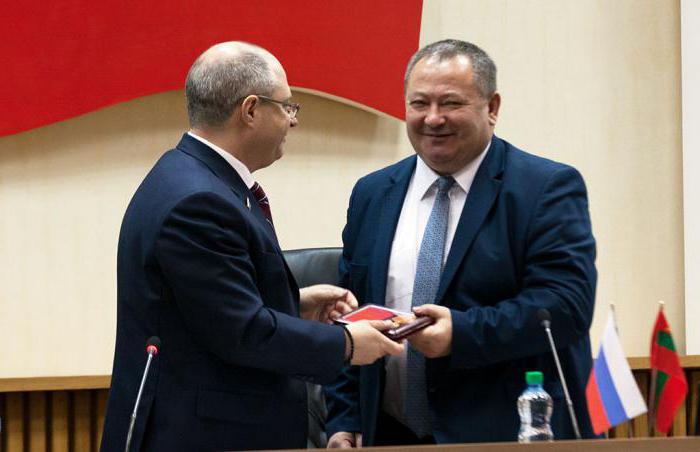
Features of the democratic system
Democracy exists when delegated (delegated) powers from the population to deputies who undertake to protect and represent the interests of the people. By acquiring powers and a deputy mandate, the elect are given special privileges, and also have certain rights and obligations.
The mandate is the basis of the relationship between the electorate and the deputy. This word is borrowed from the French language, has a Latin origin. In Rome, so-called imperial law, granting special rights to the provinces.
The semantic load of the concept
In the modern world, this term carries two main meanings.
Firstly, it is a document that certifies certain credentials. For example, in the period after the 1st World War, this status made it possible to control the colonies. Or, as now, such a document gives the right to deputy powers.
Secondly, the meaning of the word is a vacant place that can be taken by a person who has received the approval of voters. So, for example, in parliament, the number of deputy seats is 450 seats, which will be filled by the election results.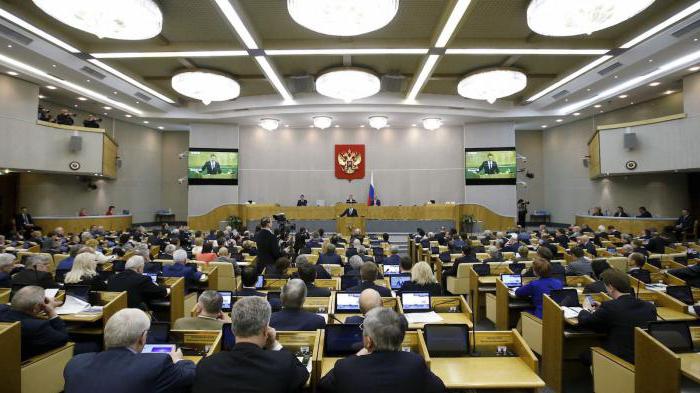
Duma Elections
In modern Russia there is a bicameral parliament. The lower house is the State Duma, whose members are elected by popular vote through ballots every four years. To count the votes, the method of distributing deputy seats using the Heir method is used. It is important that at least sixty percent of voters vote at all for the party. It organizes the election process by the CEC (Central Election Committee), which also counts votes throughout the country, sums up the results and announces the winning political parties, which then divide the mandates.
Rights of a deputy
After obtaining this status, the legislation affirms the main responsibilities. It becomes clear the legal nature of the deputy mandate. The key rights of members of the Council of the Russian Federation and deputies of the State Duma include:
- be elected and elect to strictly defined posts in the Duma;
- express their opinion on the composition of the candidatures and bodies of officials elected, appointed or approved by the Parliament;
- add issues for consideration on the agenda;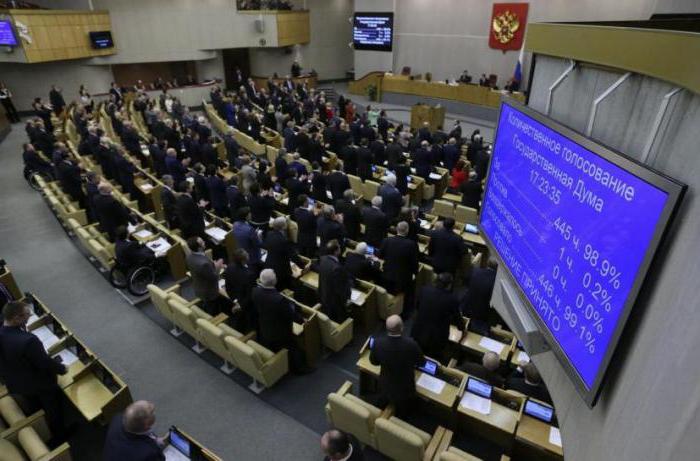
- propose a draft legal act and amendments to it for discussion at a meeting;
- make various proposals, as well as comments on the consideration of issues under discussion;
- propose at a meeting to hear an extraordinary report or information from a body or local government official who is controlled by the Duma under the Charter;
- submit for consideration the question of no confidence in the composition of bodies formed or selected by the Duma, or officials in cases provided for by the Charter;
- make proposals on the need to conduct inspections of the implementation of the Charter and regulatory legal acts by local authorities;
- participate in debates, ask appropriate questions to speakers and chairing a meeting of the Duma, demand a response, speak out with confirmation of their proposals;
- read out the appeals of citizens who, in the opinion of the deputies, are of public importance;
- The right to electoral initiative - it is exercised through the introduction of draft laws by the deputies into the State Duma, various amendments to them, legislative proposals on the creation and adoption of newly introduced federal laws and projects and their further introduction and addition to the laws of the Russian Federation, as well as through work aimed at recognizing those who have lost the strength of certain bills;
- has a casting vote on all issues considered by the corresponding chamber of the Federal Assembly (this right allows each deputy to personally participate in the work of the chamber of the country's parliament);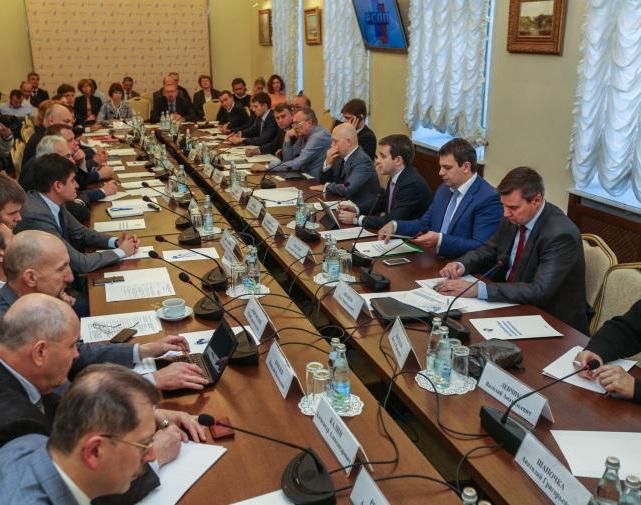
- participate in the work of commissions and committees of which the deputies are members;
- authority to receive and disseminate information. Deputies are provided with all the necessary documents that were adopted by the Federal Assembly, as well as provided with reference and information material that is officially distributed by the Presidential Administration, the Constitutional Court, the Government of the Russian Federation, as well as other supreme judicial bodies of the country and public associations. If the deputy applies to the state. authorities, local governments, enterprises, institutions, public associations, organizations (these include military units, institutions of the Ministry of Defense of the Russian Federation), the relevant official must provide him with the necessary documentation and information, regardless of the level of secrecy, observing Naturally, the conditions provided for by federal legislation on state. a secret. Moreover, directors of organizations, institutions and enterprises must provide the deputy with the right to seek professional advice on issues related to his activities as a deputy.
A deputy has no right to be absent from meetings of the State Duma.
Duties of the deputy
One of the most important duties of a deputy is maintaining constant communication with the electorate. Those who are elected in the regions maintain contact with voters in their constituency. At the same time, of course, they take into account with what region, region, city the labor and political work of the deputy of the State Duma was connected. The organization of meetings with the people occurs with the active support and participation of state bodies. authorities of the subjects of Russia, as well as local governments, command of military units, heads of various enterprises and others.
A deputy must report to voters on the results of his work, meetings held, and so on. This can be organized through the media or at the request of the population and the deputy. The administration provides premises free of charge, informs voters about the place and time of the meeting.
The people's deputy is obliged to adhere to the rules of parliamentary ethics. For its violation, liability is established by the Regulations of the Duma of the Russian Federation. He must also fulfill the instructions of the Duma, the commission of which he is a member.
Types of deputy mandate
There was an imperative mandate under the Soviet Union. Its significance was determined by the fact that the representative of the people had to listen to the orders of the population and execute them. If he could not cope with the task, the people could withdraw him and deprive him of authority.
In modern Russia there is a free deputy mandate. He does not bind the deputy with voters obligations.  A sign of a free deputy mandate is that at meetings the wishes of the electorate are taken into account, but no legal liability arises. This is found in many democracies. A deputy with such a mandate has the right to freely enter and leave the commissions. Also a sign of a free deputy mandate is the lack of the possibility of early recall of a deputy by voters.
A sign of a free deputy mandate is that at meetings the wishes of the electorate are taken into account, but no legal liability arises. This is found in many democracies. A deputy with such a mandate has the right to freely enter and leave the commissions. Also a sign of a free deputy mandate is the lack of the possibility of early recall of a deputy by voters.
Mandate holder powers
Having passed the elections to the State Duma, party members are vested with a mandate that gives them authority, but also imposes responsibility. A deputy does not have the right to engage in commercial activities; his main income is wages. He is obliged to participate in all sessions of parliament, in the activities of commissions and committees. Has the right to submit various bills for consideration, to visit authorities without hindrance.
During the entire term of the deputy mandate, the chosen one has personal inviolability. They have no right to arrest him only if he is not detained at the crime scene, to conduct a personal search, to search the car or apartment. Such measures are intended to protect against certain pressure, which is possible when a deputy performs his official duties. Unfortunately, it also happens that such powers are used for personal purposes, which can be self-serving. Also, the deputy is exempted from the obligation to testify in connection with the fulfillment of his competencies.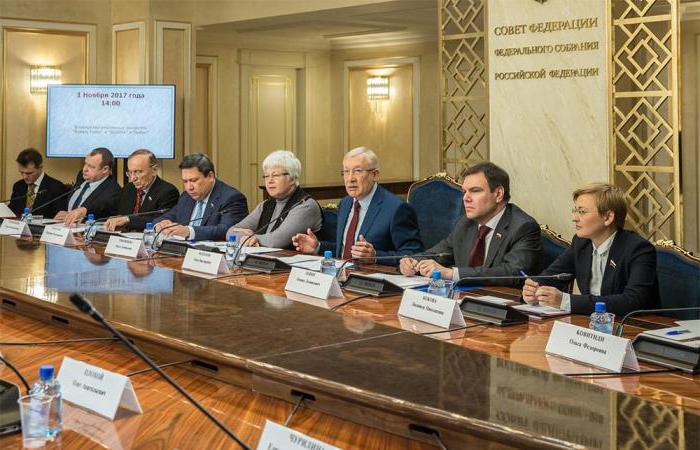
Why can they deprive the deputy mandate?
The law provides the reasons why a deputy is deprived of his mandate. The first reason that they deprived of a deputy mandate is participation in entrepreneurial activity, namely: own business or management of a commercial enterprise. Secondly, this may be due to the evidence through the court of a criminal charge.
Finally
Now there is an active discussion of amendments to the law on the status of a deputy, which will affect a number of reasons for the deprivation of a deputy’s mandate. Under consideration are items such as bank accounts abroad and property purchased there, the cost of which is much more than the deputy’s income, undeclared profits. They are going to apply such a list not only to deputies, but also to officials. An important additional item on this list is the income statement of the next of kin.